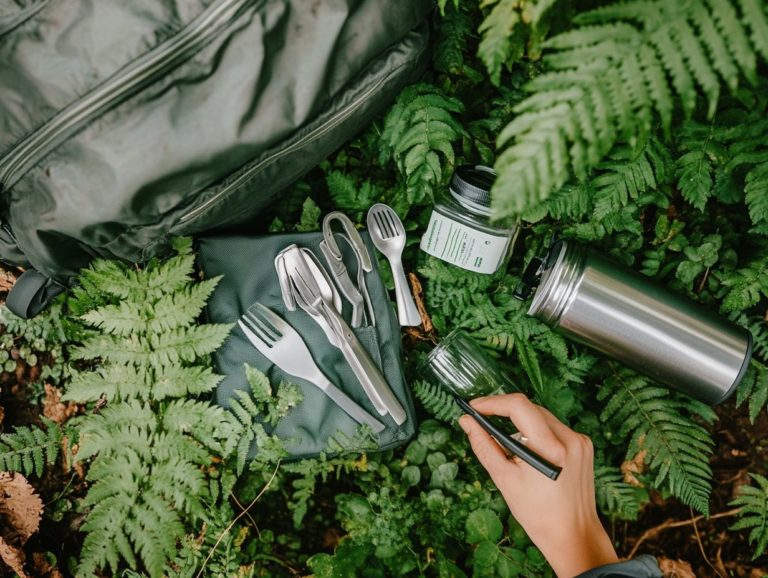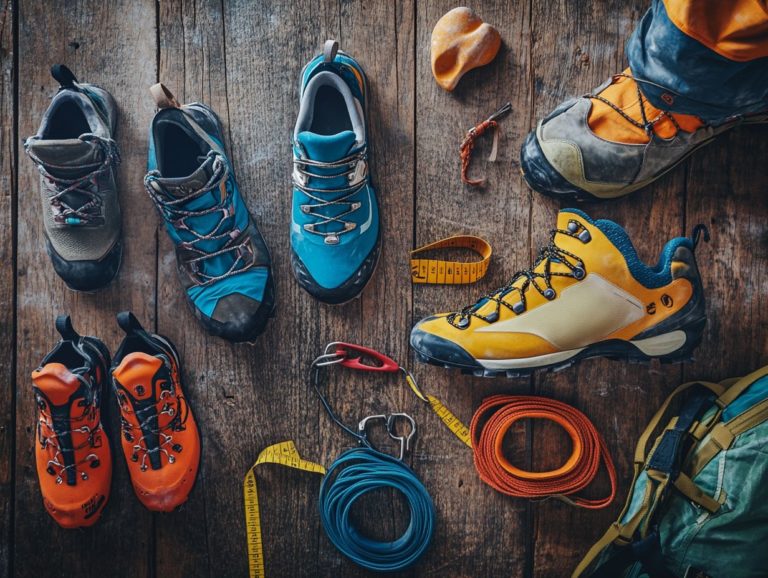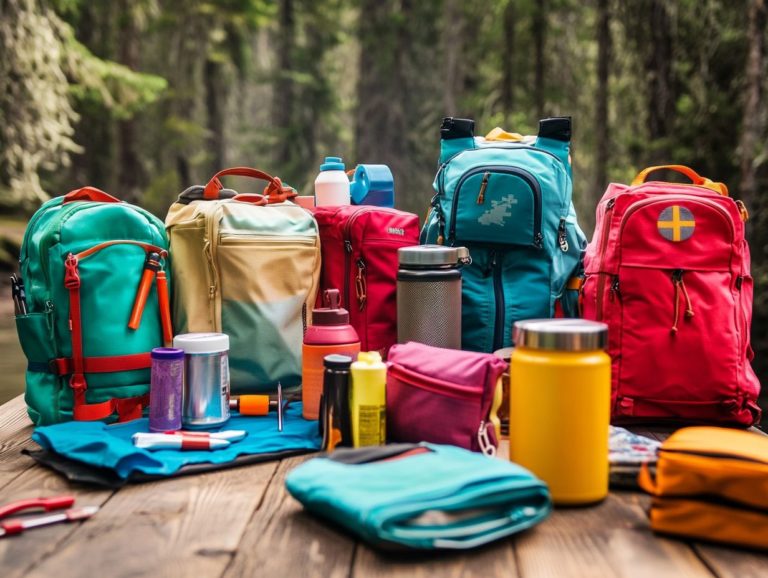What Makes a Good Backpack for Hiking?
When you embark on a hiking adventure, your hiking backpack becomes your lifeline. Selecting the right one can significantly enhance your comfort, convenience, and safety along the trail.
This guide explores essential factors to consider, from pack size and capacity to materials and durability. It highlights key features, comfort adjustments, and important aspects such as price and brand reputation.
By the time you finish reading, you’ll be equipped to choose the perfect hiking backpack tailored to your unique needs.
Contents
Key Takeaways:
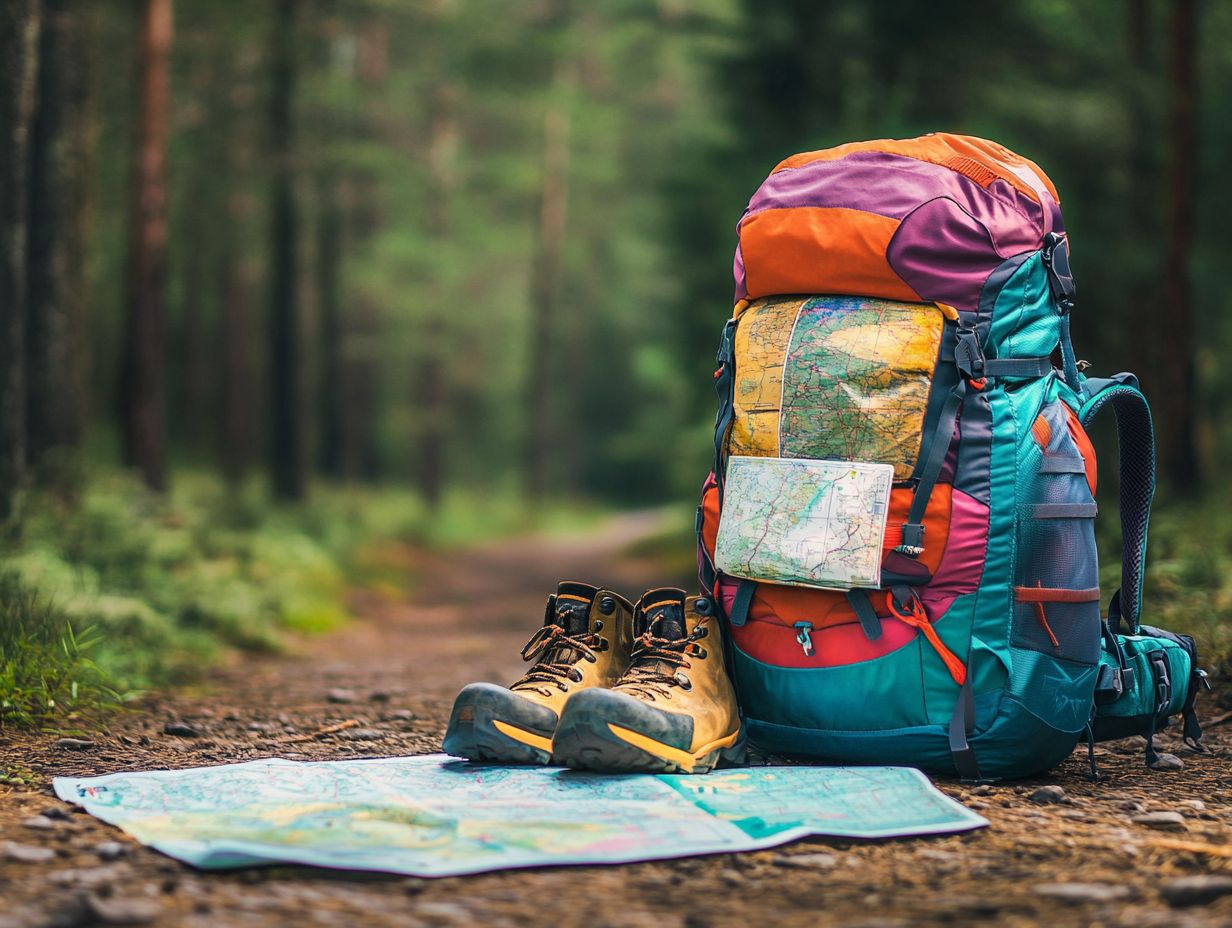
- A good hiking backpack should be chosen based on size, features, material, and comfort.
- Consider your needs, the duration of the hike, and the terrain when determining the right size.
- Essential features include durable material, proper weight distribution, and adjustable shoulder straps.
Choosing the Right Backpack for Hiking
Selecting the perfect backpack for hiking is crucial. Consider factors like size, features, and comfort.
Whether it s a multi-day trek, a weekend getaway, or a day hike, the right backpack can impact your experience.
Your ideal choice should match your personal needs and carrying capacity. Well-known brands like Osprey, Deuter, and Patagonia offer a range of options.
Ensuring the right fit helps distribute weight evenly and enhances your comfort, elevating your adventure.
Factors to Consider
Choosing a hiking backpack? Keep these key factors in mind! Comfort is key since you’ll wear the pack for extended periods.
Look for adjustable shoulder straps, a design that supports your spine, and efficient weight distribution.
The backpack’s capacity should match your hiking plans. Whether it s a compact day pack or a larger, multi-day pack, make sure it fits your needs.
Ventilation reduces sweat buildup during warm weather. Compression straps keep your load stable and close to your body.
A well-organized backpack with compartments allows easy access to your essentials, saving you time and energy.
Brand reputation matters; trusted names often ensure quality and durability. Evaluate these features to find your perfect hiking companion!
Size and Capacity
Determining the right size and capacity for your hiking backpack is crucial. You need ample storage for your gear while staying comfortable on the trail.
The size you choose depends on the length of your hike. Day packs usually range from 15 to 30 liters for short excursions, while multi-day backpacks typically start at 50 liters or more.
Understand your needs to select a pack with the appropriate load capacity, enhancing your hiking experience.
Determining the Right Size for Your Needs
To find the ideal size and fit for your hiking trips, consider the type of excursions you plan to undertake and the gear you’ll carry. For short hikes, a day pack with a capacity of 20 to 30 liters should suffice.
If you’re planning longer hikes, choose a larger backpack that exceeds 50 liters to comfortably fit essentials like food, water, and extra clothing.
Don t miss out on evaluating your personal needs based on these considerations, along with comfort and load capacity. For a weekend getaway, a pack in the 40-50 liter range might be perfect, providing enough room for a sleeping bag and cooking gear without being cumbersome.
When searching for backpacks, focus on reputable brands like Osprey and Deuter, known for designs that prioritize stability and effective weight distribution. Testing the fit and feel of a loaded pack can lead to a choice that enhances your hiking experience.
Features and Design
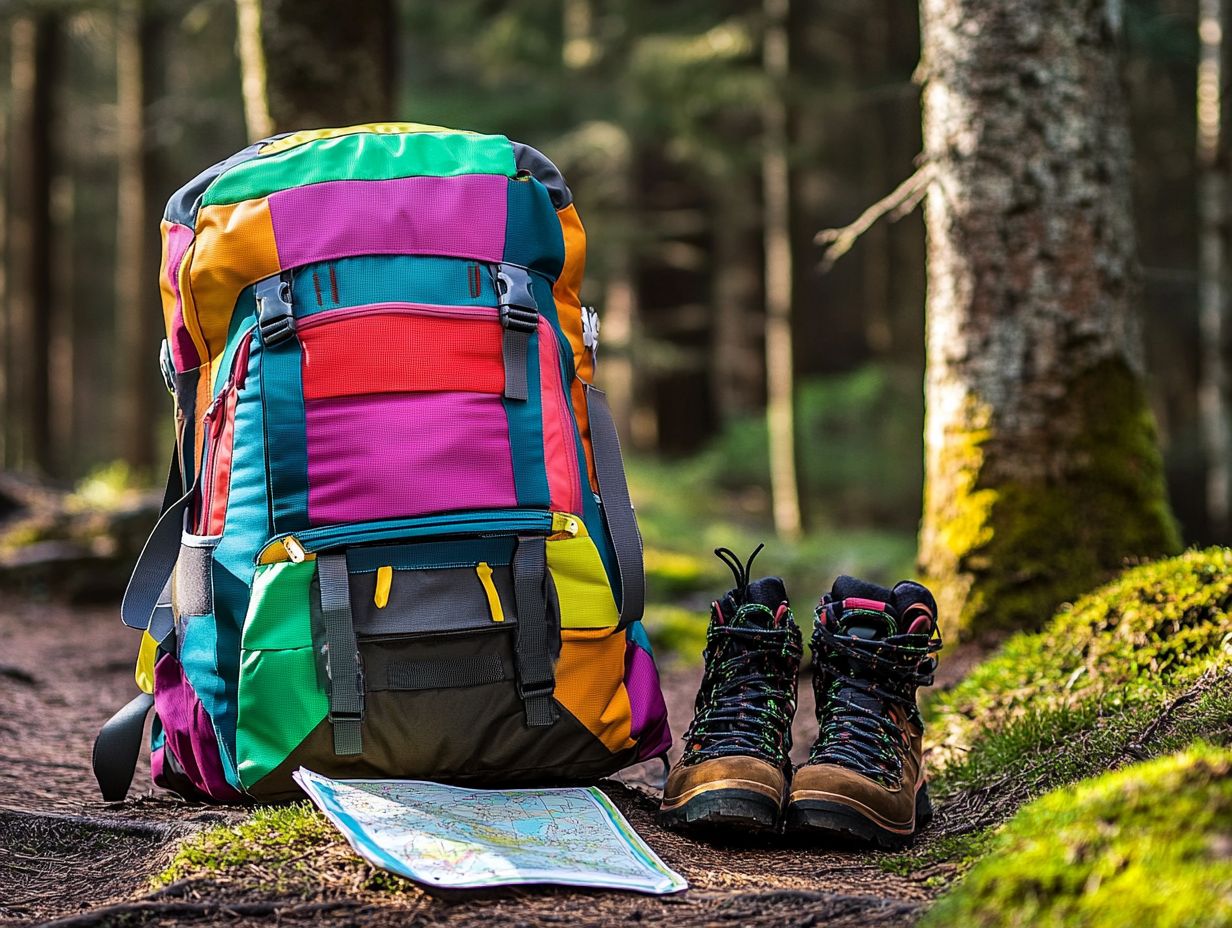
The features and design of a hiking backpack are crucial to its functionality and overall performance on the trail. Prioritize essential characteristics such as adjustable straps for a personalized fit, ventilation systems for comfort, water resistance to protect against the elements, and ample storage options like zippered pockets and water storage systems.
By focusing on these aspects, you can ensure that your backpack is not only practical but also elevates your hiking experience to new heights.
Essential Features for Hiking Backpacks
As you choose a hiking backpack, focus on several essential features that ensure comfort and functionality on the trail. Look for adjustable shoulder straps that enhance fit, effective ventilation systems to keep you cool, and generous storage options for organizing your gear.
Consider the load capacity and weight distribution to guarantee that your backpack performs admirably, whether you’re heading out for a day hike or embarking on an extended multi-day adventure.
An adjustable back panel is a key feature that can significantly elevate your comfort. It accommodates various torso lengths, providing a tailored fit just for you. Models like the Osprey Atmos AG and Gregory Baltoro not only offer these adjustments but also incorporate breathable mesh to enhance airflow, making long hikes feel more comfortable.
The capacity of a backpack, typically ranging from 30 to 70 liters, determines how much gear you can carry and directly influences your overall stability and balance on the trail. Efficient packing becomes effortless with the Deuter Aircontact Lite, which promotes easy organization and optimal weight distribution, transforming your hiking experience into an enjoyable journey.
Considerations for Different Types of Hiking
Different types of hiking require various backpack features, tailored to the length and intensity of your adventure. For a day hike, a compact day pack equipped with essential features will work well. If you re embarking on a multi-day trek, you need a larger backpack designed for durability, load capacity, and comfort.
The right backpack design should align with the specific demands of your hiking journey, enhancing both your performance and enjoyment.
If you re tackling a challenging ascent through rugged terrain, a backpack with lumbar support and adjustable straps can be invaluable, minimizing strain during long climbs. A leisurely stroll along a scenic trail may instead call for a lightweight pack, allowing for greater freedom of movement.
For overnight excursions such as backpacking trips, look for features like water storage systems and external attachment points for trekking poles or sleeping bags. By considering these nuances, you ensure that your backpack complements your unique hiking style, fostering an enjoyable experience in the great outdoors.
Explore various hiking backpack options to find the perfect fit for your adventures!
Material and Durability
The quality and durability of your hiking backpack are essential elements that significantly impact both its performance and longevity. Choosing high-quality materials ensures your pack is water-resistant, lightweight, and capable of enduring the challenges of the trail.
By selecting durable fabrics and reinforced stitching, you can greatly extend the lifespan of your backpack, making it a wise investment for dedicated hikers like yourself.
Best Materials for Hiking Backpacks
When selecting a hiking backpack, you should seek materials that combine well durability, lightweight design, and water resistance. This will ensure you have a reliable companion for your outdoor adventures.
Ripstop nylon is known for its tear-resistant qualities, making it ideal for tough terrains. High-denier polyester, a strong type of polyester, offers excellent UV protection, which can significantly extend the lifespan of your pack in harsh sunlight.
Osprey and Deuter use these materials effectively, resulting in backpacks that endure wear and tear while providing ample storage without feeling cumbersome. The incorporation of waterproof coatings enhances the backpack’s capability to keep your gear dry an essential feature during unpredictable weather shifts.
Comfort and Fit
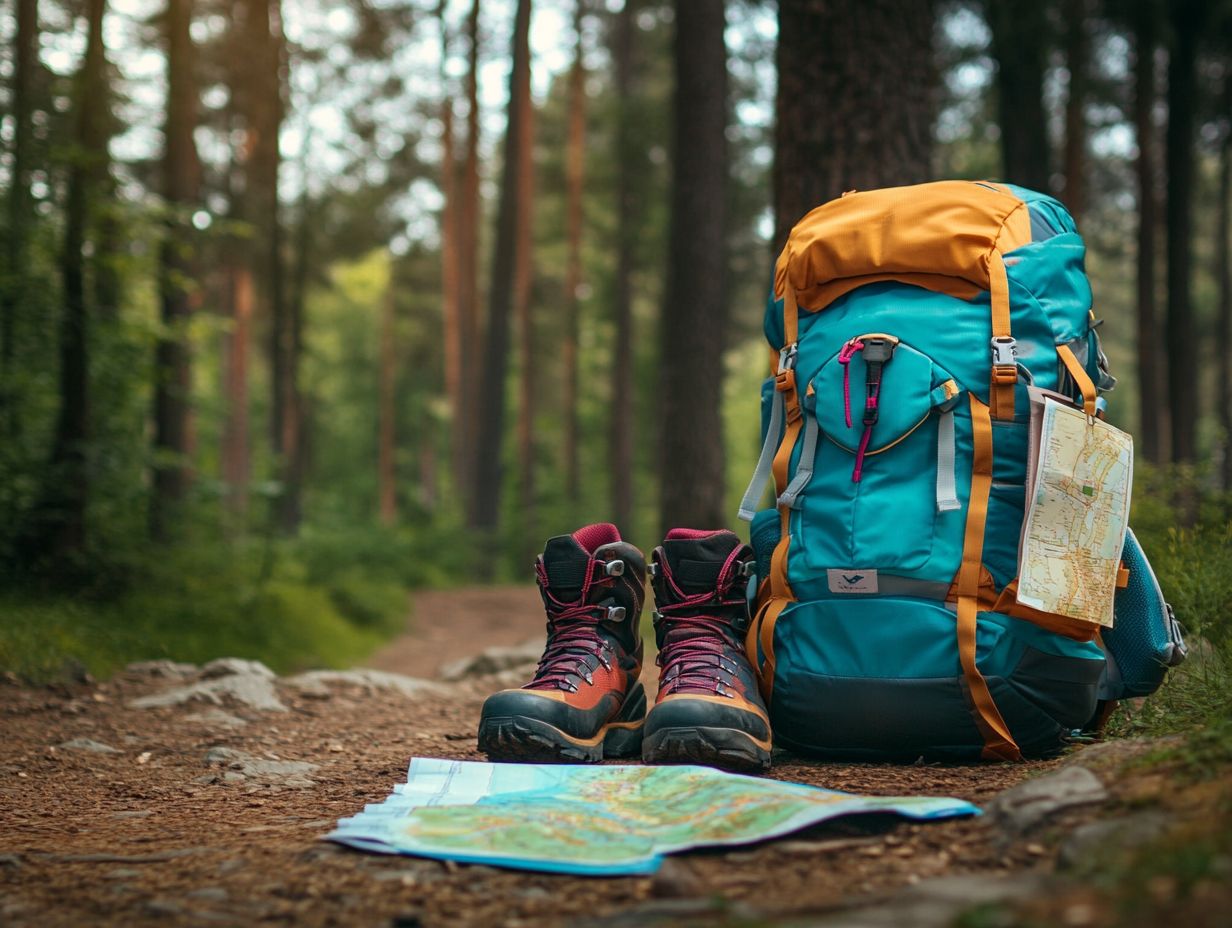
When selecting a hiking backpack, comfort and fit are paramount; they directly influence your experience on the trail. A well-fitted backpack distributes weight evenly, alleviating strain on your shoulders and back.
Look for features like adjustable straps and a thoughtfully designed back panel. These elements are essential for achieving that perfect fit, allowing you to carry your gear comfortably for hours on end.
Adjusting and testing for comfort in your hiking backpack is essential for achieving a secure and enjoyable fit during your outdoor adventures. By customizing the adjustable shoulder straps, hip belt, and load lifters, you can unlock a level of comfort tailored specifically to your unique body shape and size.
It s equally important to ensure that the back panel aligns seamlessly with the natural curve of your spine; a misalignment can lead to discomfort, especially over long distances. When you fine-tune these elements, you ll likely experience a significant reduction in fatigue, allowing you to immerse yourself in the breathtaking surroundings.
Ultimately, a well-fitted backpack promotes better posture and enhances your overall stability, making each step on the trail that much more enjoyable. Are you ready to find the perfect fit for your next adventure?
Additional Considerations
When you re in the market for a hiking backpack, consider a few additional factors, such as price, brand reputation, and user reviews. These can greatly shape your decision-making process.
Opting for a well-respected brand like Osprey, Deuter, or Patagonia typically guarantees quality and innovative features that elevate your hiking experience.
By examining user reviews, you ll gain valuable insights into real-world performance and comfort, enabling you to make a thoroughly informed choice. Choosing the right backpack can transform your hiking experience let’s make it count!
Start your hiking journey with the right backpack today!
Price, Brand, and User Reviews
Price, brand, and user reviews are essential elements to consider when investing in hiking gear, especially backpacks! Well-known brands like REI Co-op and ALPS OutdoorZ often come with warranties and customer support, ensuring that you truly get your money s worth.
User reviews provide valuable insights into the performance and durability of various backpack models. They help you make the best choice for your hiking adventures.
When selecting hiking gear, understanding pricing can lead you to options that align with your budget and cater to your specific hiking needs. Remember, a higher price tag doesn t always mean better quality! You might find that some lesser-known brands offer exceptional performance at a fraction of the cost.
It s crucial to assess your own requirements such as capacity (how much gear the backpack can hold), weight, and comfort while considering brand reputation and user feedback. By analyzing reviews and comparing important features across different models, you can ensure that the backpack you select enhances your outdoor experience, making your journeys enjoyable and effortless!
Frequently Asked Questions
What Features Should a Good Hiking Backpack Have?
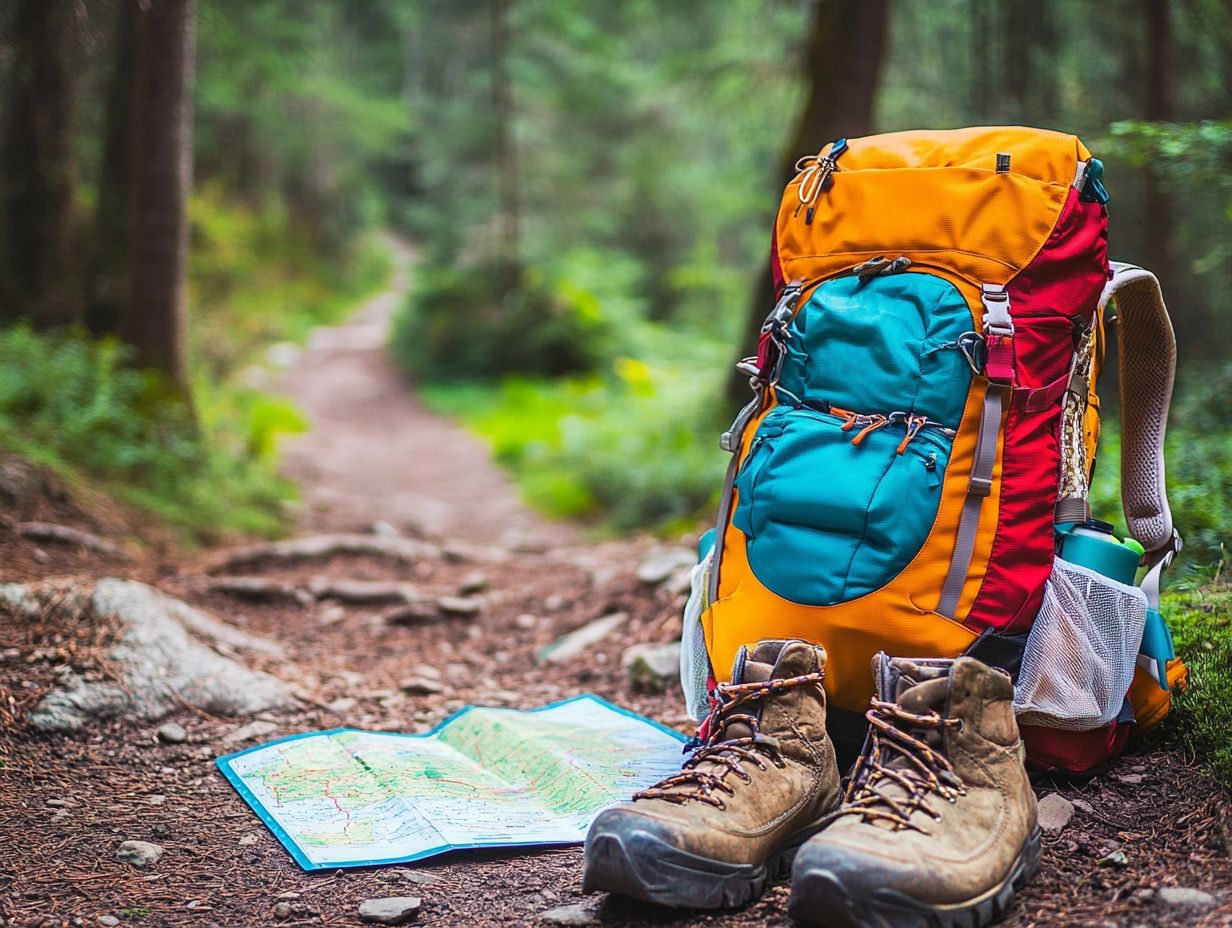
A good backpack for hiking should have the following important features:
What is the ideal capacity for a hiking backpack?
A good hiking backpack should have a capacity of at least 30-40 liters to accommodate all necessary gear and supplies.
What materials should a good hiking backpack be made of?
A good hiking backpack should be made of durable and water-resistant materials such as nylon or polyester to withstand outdoor conditions.
Are there specific features to look for in a good hiking backpack?
Yes, a good hiking backpack should have features like multiple compartments, adjustable straps, and ventilation for comfort and organization.
Can a good hiking backpack be used for other activities?
Yes! A good hiking backpack can also be used for other outdoor activities such as camping, backpacking, and traveling.
What should I consider when choosing a good hiking backpack?
When choosing a good hiking backpack, consider factors such as fit, weight, durability, and important features to ensure it meets your specific needs and preferences.

